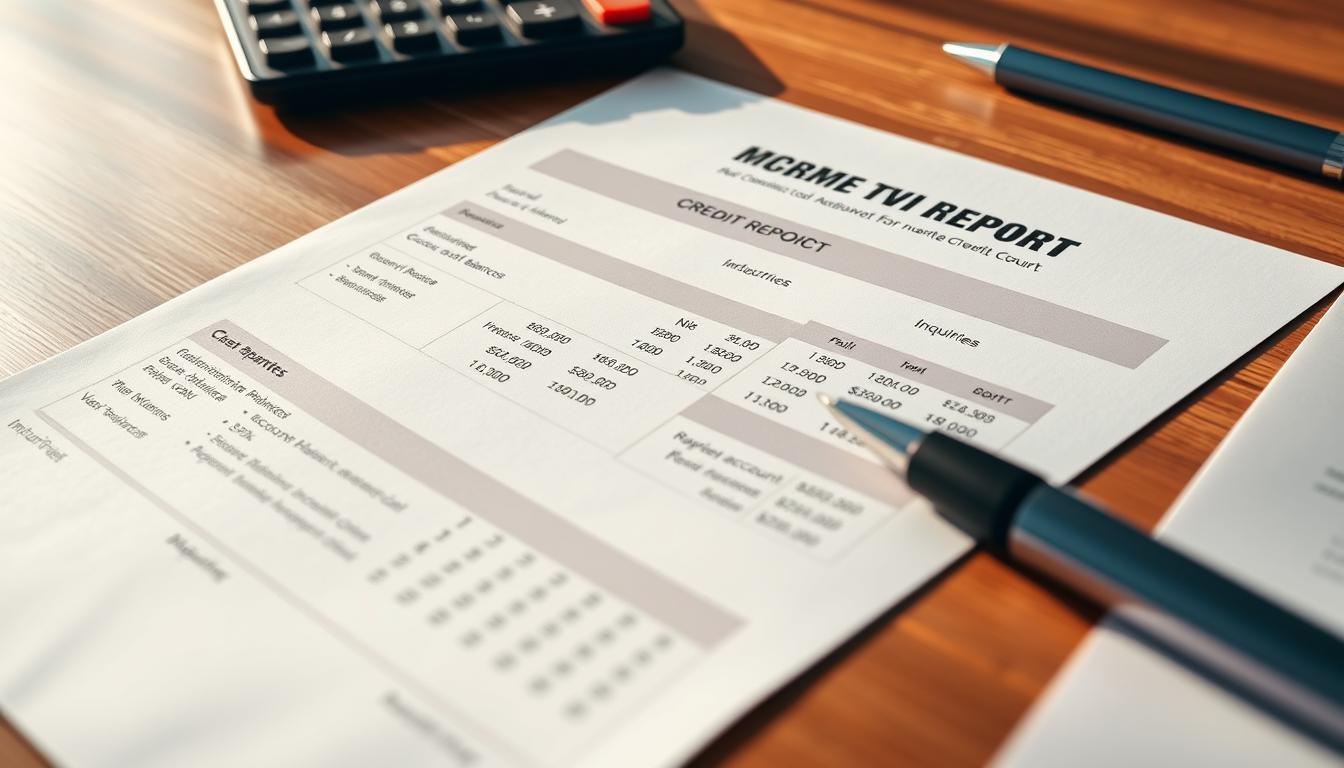Understanding CCR credit inquiries is vital for a healthy financial profile. These inquiries can impact your credit score in different ways. This guide will explore CCR credit inquiries and their effects on your finances.
We’ll cover the types of inquiries and their purposes. You’ll learn about monitoring your credit report and disputing errors. We’ll also discuss managing credit utilization effectively.
By the end, you’ll grasp how CCR credit inquiries influence your financial well-being. This knowledge will help you make informed decisions about your credit.
Key Takeaways
- CCR credit inquiries can impact your credit score, but the effect varies depending on the type of inquiry.
- Soft inquiries, such as those from credit checks for pre-approvals or your own credit monitoring, do not affect your credit score.
- Hard inquiries, like those from applying for a new credit card or loan, can temporarily lower your credit score.
- Monitoring your credit report regularly and disputing any errors is crucial for maintaining a healthy credit profile.
- Understanding the role of credit bureaus and credit monitoring services can help you effectively manage your CCR credit inquiries.
Understanding CCR Credit Inquiries
Credit inquiries are when lenders review your credit report. They assess your creditworthiness and can affect your credit score. These checks are crucial for your credit history.
Types of Credit Inquiries
Credit inquiries come in two main types: soft and hard. Soft inquiries don’t affect your credit score. These include checking your own report or getting pre-approved offers.
Hard inquiries happen when you apply for new credit. These can temporarily lower your credit score. Examples include applying for loans or credit cards.
Impact on Credit Score
Hard inquiries may cause a small, temporary drop in your credit score. However, this impact is usually short-lived. Your score can bounce back within months if you maintain good credit habits.
Soft inquiries have no effect on your credit score. They’re harmless and don’t impact your creditworthiness.
| Inquiry Type | Impact on Credit Score |
|---|---|
| Soft Inquiry | No impact |
| Hard Inquiry | Temporary, minor decrease |
Knowing about credit inquiries helps maintain a healthy credit history. Being aware of your credit checks allows for better financial decisions. Stay informed to protect your credit score.
“Monitoring your credit report and understanding credit inquiries is the key to maintaining a strong credit score.”
Why Do CCR Credit Inquiries Matter?
CCR credit inquiries shape your financial profile. They give lenders insights into your credit history and financial behavior. These insights impact loan approvals, terms, and interest rates.
Knowing how credit inquiries affect you is key. It helps you manage your credit report and maintain a good credit score. This awareness lets you take steps to show responsible financial management.
| Credit Inquiry Impact | Short-term Effect | Long-term Effect |
|---|---|---|
| Hard Inquiry | Potential drop in credit score | Remains on credit report for up to 2 years |
| Soft Inquiry | No impact on credit score | Not included in credit report |
Monitoring your credit report is crucial. It helps you understand CCR credit inquiries better. This knowledge allows you to make smart choices about your financial future.
You can improve your credit score and creditworthiness with informed decisions. Keep track of your inquiries to maintain a strong financial profile.

“Maintaining a healthy credit history is crucial in today’s financial landscape, and understanding the impact of CCR credit inquiries is a key part of that process.”
Soft vs. Hard Credit Inquiries
Credit inquiries come in two types: soft and hard. They affect your credit score and credit report differently. Understanding these differences is key to managing your credit.
Soft Credit Inquiries Explained
Soft credit inquiries don’t impact your credit score. They happen when you check your own credit report or a business reviews it.
These inquiries are often used for credit monitoring or pre-approved offers. They’re informational and don’t involve applying for new credit.
Hard Credit Inquiries Defined
Hard credit inquiries occur when you apply for new credit. This includes credit cards, loans, or other financing options.
These inquiries can temporarily lower your credit score. They stay on your credit report for up to two years.
However, their impact on your score usually decreases over time. Hard inquiries show you’re actively seeking new credit.
| Soft Credit Inquiries | Hard Credit Inquiries |
|---|---|
| Don’t affect your credit score | Can temporarily lower your credit score |
| Occur when you check your own credit report or for pre-approved offers | Occur when you apply for new credit, such as a credit card or loan |
| Remain on your credit report for up to 2 years | Remain on your credit report for up to 2 years |
Knowing about soft and hard credit inquiries helps manage your credit health. Soft inquiries are harmless. Hard inquiries can briefly affect your score.
Permissible Purpose for CCR Credit Inquiries
Credit inquiries have specific “permissible purposes” under the Fair Credit Reporting Act (FCRA). These allow lenders and creditors to access your credit report. Permitted instances include applying for credit, renting property, or account reviews for fraud.
Understanding these purposes helps you spot unauthorized checks on your credit history. This knowledge allows you to monitor your financial profile effectively. You can take action if needed to protect your credit.
- Applying for credit (e.g., credit card, loan, or mortgage)
- Renting an apartment or home
- Creditor reviews for account monitoring and fraud detection
- Employment-related background checks
- Insurance underwriting
- Court orders or subpoenas
“Understanding the permissible purposes for credit inquiries is crucial in ensuring the integrity of your financial records and protecting your creditworthiness.”
Knowing the lawful reasons for credit inquiries helps you navigate credit reporting. It empowers you to make smart choices about your financial health. Stay informed to protect your creditworthiness.
Monitoring Your Credit Report
Keeping an eye on your credit report is crucial for a healthy credit profile. You can get a free report yearly from Experian, Equifax, and TransUnion. Reviewing helps spot errors that could harm your credit score.
Look for unauthorized inquiries or incorrect account info. These issues can negatively impact your credit score if left unchecked.
Checking Your Credit Report Regularly
Review your credit report at least once a year. This helps catch and fix problems early. Regular checks can prevent long-term damage to your credit history.
- Request your free annual credit report from each of the three major credit bureaus: Experian, Equifax, and TransUnion.
- Carefully review the information in your credit report, including your personal details, account information, and credit inquiries.
- Immediately address any errors or discrepancies by disputing them with the appropriate credit bureau.
- Consider enrolling in a credit monitoring service to stay on top of changes to your credit report and credit score.
Active monitoring helps maintain a healthy credit profile. It ensures your credit score reflects your financial responsibility accurately. Address any issues promptly to protect your financial future.
Disputing Errors on Your Credit Report
Your credit report’s accuracy is vital for your financial health. If you find errors, you can dispute them with credit bureaus. This process helps maintain your credit information’s integrity.
Here’s how to dispute credit report errors:
- Identify the specific error or inaccuracy on your credit report.
- Contact the relevant credit bureau(s) – Experian, Equifax, or TransUnion – to initiate the dispute.
- Provide supporting documentation or evidence to substantiate your claim of the error.
- The credit bureau will investigate the dispute and verify the information with the data furnisher (e.g., a creditor).
- If the error is verified, the credit bureau will correct the information on your credit report.
Credit bureaus must legally investigate your dispute within a set timeframe. Taking action on errors can boost your credit score. It also protects your financial reputation.
| Credit Bureau | Dispute Contact Information |
|---|---|
| Experian | P.O. Box 4500, Allen, TX 75013 |
| Equifax | P.O. Box 740256, Atlanta, GA 30374 |
| TransUnion | P.O. Box 2000, Chester, PA 19016 |
Understanding this process helps you keep your credit report accurate. It’s a key step in safeguarding your financial future.

“Regularly monitoring your credit report and promptly addressing any errors is essential for maintaining a healthy credit profile.”
“ccr credit inquiry” and Credit Utilization
Your credit utilization ratio is crucial for your credit score. It shows how much available credit you’re using. This metric significantly affects your overall credit score.
Experts suggest keeping your credit utilization below 30%. This shows responsible credit management and can boost your credit score. High credit utilization can harm your credit report and score.
“Keeping your credit utilization low is one of the best ways to improve your credit score and maintain a healthy financial profile.”
To track credit utilization, check your credit report often. Compare your credit card balances to your total available credit. Understanding ccr credit inquiries and credit utilization helps you make smart financial choices.
Balancing ccr credit inquiries and credit utilization is vital. This approach strengthens your credit score and secures your financial future.
Credit Freezes and CCR Credit Inquiries
A credit freeze lets you limit access to your credit report. It blocks potential creditors from making hard inquiries on your credit. This reduces the risk of identity theft and unauthorized credit applications.
How Credit Freezes Work
A credit freeze locks down your credit report with major credit bureaus. These include Experian, Equifax, and TransUnion. It makes it harder for anyone to open new credit accounts in your name.
To set up a freeze, contact each credit bureau individually. The process is quick and free. You’ll get a unique PIN from each bureau to lift or remove the freeze.
Credit freezes don’t affect existing accounts or your credit score. You can still use current credit cards and access your report. Lifting a freeze is easy and can be done online or by phone.
- Credit freezes do not affect your existing credit accounts or credit score.
- You can still use your current credit cards and access your credit report during a freeze.
- Lifting a credit freeze, either temporarily or permanently, is also a straightforward process that can be done online or by phone.
Understanding credit freezes helps you manage CCR credit inquiries effectively. It protects your credit profile from potential fraud or abuse.

Tips for Managing CCR Credit Inquiries
Keeping a healthy credit profile takes effort and smart actions. Here are some strategies to manage CCR credit inquiries:
- Monitor your credit report regularly for unauthorized or inaccurate inquiries. Catching these issues early can help protect your credit score.
- Limit the number of hard credit inquiries by only applying for credit when necessary. Each hard inquiry can temporarily impact your credit score.
- Keep your credit utilization ratio low, ideally below 30%. This demonstrates responsible credit management to lenders.
- Utilize credit monitoring services to stay informed about changes to your credit report and detect any suspicious activity.
- Promptly dispute any errors or unauthorized credit inquiries with the credit bureaus to ensure the accuracy of your credit report.
- Consider placing a credit freeze on your report to restrict access to your personal credit information and reduce the risk of identity theft.
These tips can help you manage CCR credit inquiries effectively. They’ll also help you maintain a strong, reliable credit profile.
“Proactive credit management is the key to building a solid financial foundation.”
The Role of Credit Bureaus
Credit bureaus are key players in managing your credit profile. Experian, Equifax, and TransUnion are the three major credit bureaus. They collect and maintain information about your credit history.
This includes credit inquiries, accounts, and payment history. Understanding their role helps you manage your credit effectively.
Major Credit Bureaus Explained
Experian, Equifax, and TransUnion are the main credit bureaus in the United States. They gather data from various sources like credit card companies and lenders. This data creates your credit report and credit score.
Your credit report details your credit history. Your credit score shows your creditworthiness. Lenders, landlords, and employers use this information to assess your financial reliability.
They use it for credit decisions, rental applications, and job offers. Understanding credit bureaus helps ensure your credit report accurately reflects your financial standing.
| Credit Bureau | Description |
|---|---|
| Experian | One of the three major credit bureaus in the United States, Experian collects and maintains consumer credit information, including credit reports and credit scores. |
| Equifax | Equifax is another prominent credit bureau that gathers and stores consumer credit history data, providing credit reports and credit scores to lenders and other authorized parties. |
| TransUnion | TransUnion is the third major credit bureau in the U.S., responsible for collecting, analyzing, and distributing consumer credit information, credit reports, and credit scores. |

Knowing how credit bureaus work helps you monitor your credit report and dispute errors. You can manage your credit profile better. This can improve your credit score and overall financial health.
Credit Monitoring Services
Credit monitoring services are vital for keeping track of your credit information. They provide regular updates on your credit report. These updates include changes and suspicious activity, helping you manage your credit profile.
Credit monitoring services typically offer the following features:
- Regular access to your credit report and credit score from the major credit bureaus
- Alerts for any changes or new credit inquiries on your report
- The ability to dispute errors or unauthorized activity directly with the credit bureaus
- Guidance and support in understanding your credit report and score
These services keep you informed about your credit report and credit score. They help you spot potential credit inquiries or issues quickly. This protection is crucial against identity theft and for maintaining a healthy profile.
| Feature | Benefit |
|---|---|
| Regular credit report access | Stay informed about the status of your credit |
| Credit change alerts | Quickly identify and address any suspicious activity |
| Dispute assistance | Ensure the accuracy of your credit report |
| Credit education | Gain a better understanding of your credit profile |
Credit monitoring services help protect your financial well-being. They’re essential in today’s digital world where risks are constant. These services help you maintain a healthy credit score.
“Regularly monitoring your credit report is one of the best ways to stay on top of your financial health and catch any potential issues early on.”
Conclusion
CCR credit inquiries are vital for your credit profile. They affect your credit score and overall creditworthiness. Understanding credit inquiries helps you manage your credit effectively.
It’s important to know the difference between soft and hard inquiries. Knowing the allowed reasons for these checks is also crucial.
Regularly monitoring your credit report is key. Address any errors through the dispute process to keep your credit history accurate.
Use credit freezes and credit monitoring services for extra protection. These tools help you stay vigilant over your credit profile.
Taking control of your credit history is crucial for financial success. It helps you maintain a healthy credit score. Be diligent with CCR credit inquiries to build a solid financial future.

